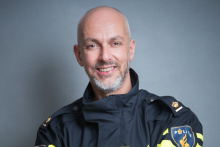It remains a difficult question within the police force: how do you get officers to acknowledge their own biases? Böing, who also works for the police, studied this issue and will defend his dissertation titled Discussing the Elephant in the Room – Addressing Ethnic Profiling with Virtual Reality in Police Training. According to him, a raised finger or a top-down approach tends to backfire.
Putting people into boxes
The official definition of ethnic profiling is ‘the use of criteria such as skin colour, ethnicity, nationality, or religion in law enforcement without objective justification.’ Böing calls it a human trait. ‘We all have biases about others, and we’re used to putting people into boxes.’
The risk of this happening within the police may be greater than in other professions, because of what he calls ‘occupational deformation’. ‘If you focus all day on the criminal side of society, it can distort your perception,’ Böing explains. ‘When you encounter someone who fits the characteristics of a group you subconsciously associate with negative behaviour – for instance, a particular ethnicity – you’re more likely to assume that person has bad intentions by default.’
According to the Dutch Scientific Research and Data Centre, people with a migration background appear before the courts relatively often. But, Böing stresses, that doesn’t mean an entire population group should be judged accordingly.
Awareness and willingness to change
Everyone sees the world through a subjective lens, but not every officer is willing to face that. Böing divides police attitudes towards ethnic profiling into four categories. The first group, the Don’t knows, never think about it. ‘This group denies being racist and call themselves colour-blind.’ The Don’t cares are aware of it but dismiss it as woke nonsense, an imported American hype. ‘They are often white officers who have never experienced discrimination themselves,’ says Böing. The Don’t wants consider the issue undermining and fear it damages the police’s reputation. The Don’t dares would like to address it but don’t dare to speak up for fear of exclusion. ‘Often, though not always, these are officers of colour who have experienced discrimination themselves.’
No miracle cure
So, police officers aren’t usually eager to engage with the topic. How does Böing manage to get them involved? He explains that most officers aren’t bookish types – they prefer learning by doing. And VR training has a certain appeal. ‘Those headsets have a kind of magnetism.’
Wearing the headset, participants take part in an interactive scenario based on real-life cases. One example is a story inspired by recent events in Kampen, where a group of citizens formed a neighbourhood watch after a local asylum seeker committed a rape. Afterwards, they started detaining every African-looking resident of the nearby asylum centre. In the simulation, officers must make decisions that determine how the story unfolds. The VR itself isn’t the magic ingredient, though – the real value lies in the discussions afterwards.
‘In small groups of up to eight participants, a trainer leads a conversation about everyone’s choices. That’s when they sometimes realise they’ve made biased decisions. The best outcome is when teams say they’re still talking about it later during coffee breaks.’ Böing has now trained around four hundred instructors within the police. It’s more effective to recruit trainers from within the organisation, he explains. ‘Officers are more likely to accept new insights from colleagues than from someone detached from the field.’
No structural approach yet
Further research shows that the training is more effective when repeated regularly. That’s why Böing believes leadership involvement is crucial – they can encourage participation and ensure it becomes a structural part of police training. ‘This takes time. Without regular repetition, people revert to old habits.’
The VR training already earned him an innovation award from Europol, which opened doors to additional funding. With that, Böing and his team are developing new case studies. The award also led to international interest. ‘Belgium is now using our Dutch training materials, and for Germany, we’ve created a fully localised version.’






